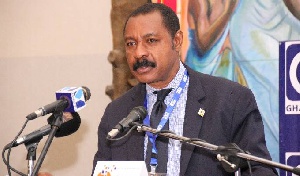The Private Enterprises Federation (PEF) has urged government to decentralize the application process in acquiring licenses and permits through the use of an electronic platform with complementary bank accounts to reduce delays and save time.
The Federation believes that the processes would require that applicants file scanned copies of all supporting documents through a designated website created by the respective agencies receiving applications and enable them pay application fees directly into the agency’s account.
This, the Federation said, would help reduce the time it takes to process applications by business enterprises as well as serve as data base for reference and research purposes.
Nana Osei Bonsu, Chief Executive Officer of PEF, made the call when he spoke during a panel discussion in Accra on the Ghana Journalists Association programme dubbed: “Business Advocate” on Ghana Television.
The programme on the topic: “Streamlining the Processes and Procedures for Permits, Certificates and Licenses for Business Operations”, is supported by BUSAC Fund, Denmark Embassy, United States Agency for International Development and the European Union.
Nana Bonsu said business organizations in the country have expressed worry about the unjustified delay in the processes they go through to obtain a license to operate, adding that a prospective applicant had to go through six frustrating processes to get a permit.
The Federation is urging government to resource agencies mandated in processing the acquisition of licenses and permits for business operations to perform effectively.
He was of the view that the private sector can be more competitive if these agencies are adequately resourced to perform satisfactorily adding that the little budget released to these agencies delays effective and efficient delivery of service.
Nana Bonsu said a study of the regime for business registrations in the country was carried out in 2008 at the request of the Ministry of Trade and Industry to review the time and cost for complying with requirements for registration with the Companies Registry, and various local government authorities.
He said as a follow up to that study, in 2009 the USAID in partnership with PEF sponsored a research study to establish all licensing and permit requirements affecting businesses in the country.
The study, he said, revealed that a total of 145 or more business licenses or permit requirements were in force in the country and this affected businesses to varying degrees.
Nana Bonsu said the Federation recommended that a percentage of user fees be charged by the respective agencies to be retained for the day to day running of the agencies including purchases of logistics and its maintenance.
“The Federation also recommended a sustained public education [effort] through brochures explaining requirements, processes and timelines to help the businesses understand the policies and laws that govern the operations of the respective agencies as well as the application processes and procedures employed to service the business community”, he said.
Mr Ben Azure, Vice Chairman for Parliamentary Select Committee on Environment, Science and Innovation, urged agencies to fast track the processes since any delays caused in acquiring the licences and permits added to the cost of doing business.
Mr Charles Okyere, the Managing Partner at Lawfields Consulting, urged business organisations to channel their grievances to the Parliamentary Select Committee for redress, adding that stakeholder engagement is critical in solving the issues.
Mr Alhassan Mohammed, Principal Officer, Town and Country Planning Department, said the department is currently understaffed and is operating at a minimum level 34 per cent of technical staff.
Business News of Monday, 22 February 2016
Source: GNA













